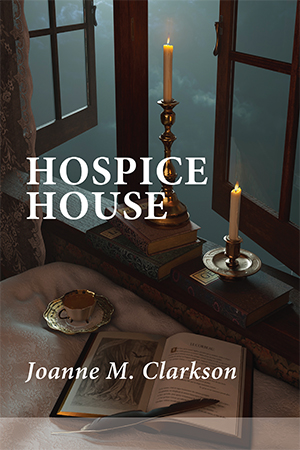Joanne M. Clarkson


Joanne M. Clarkson fell in love with poetry as a child and it has been a life-long relationship. Her favorite poem, at 10, was “The Highwayman” by Alfred Noyes. She won her first poetry contest in fifth grade with rhyming verse about Mt. Rainier. Since then, she has had a thousand favorite poems and has published many of her own. Her fifth collection, The Fates, won Bright Hill Press’ annual contest and was published in 2017. She has received a Grant for Artist Progress (GAP) from Artist Trust and was awarded an NEH Poetry in Person Grant to teach poetry in rural libraries.
Clarkson has Master’s Degrees in English and Library and Information Science. She taught and then worked as a professional librarian for many years. After caring for her mother through a long illness she re-careered as a Registered Nurse, specializing in Home Health and Hospice. Her memoir, There’s Always a Miracle: True Stories of Life Before and After Death (Black Triangle Press, 2022), includes chapters from her personal life and her hospice work.
Besides poetry, her life-long avocation has been reading palms and Tarot. She was taught by her grandmother, psychic Esther Monson. She continues to give personal readings and classes and to add mystical moments to events and celebrations.
Clarkson lives with her husband James in Port Townsend, WA. She loves spending time with family, including 5 children and 4 grandchildren. She gardens and she and her husband avidly dance Argentine Tango.
Hospice House was featured in the Saturday Book Feature by Autumn Sky Poetry.
Read a review of Hospice House by the Bookmonger, Barbara Lloyd McMichael in Coast Weekend
Watch a recording of Joanne reading from Hospice House, along with Risa Denenberg:

|

|

|
Poem from Hospice House
Sweet Healing
Everyone has some memory of honey. I cut a wound-shaped piece of infused felt and place it gently on the burn left to fester for days. The oldest cure made new. I watch her facial muscles relax as the arm agony eases under the holy fear of bees, her mind wandering through ninety years of hollyhock and clover. Even science isn’t sure why it works: nutrient, antiseptic or simply a second, golden skin? She lives alone, with a woman who comes in once a week to clean, and a neighbor who found her, forearm inflamed by teapot steam. And me, the visiting nurse who wraps gauze around the terrible, deep sweetness and promises to return day after tomorrow with fireweed, honeysuckle, an orchard in June.


